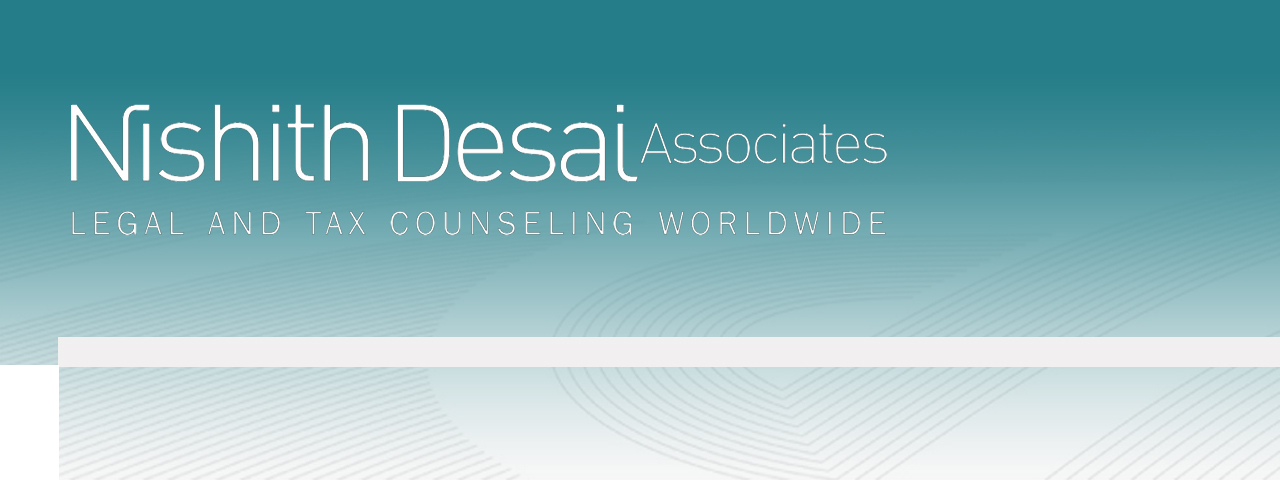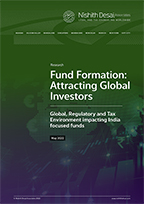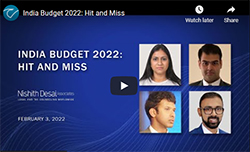Fund Formation: Attracting Global Investors
June 18, 2022
Chambers and Partners Asia-Pacific: Band 1 for Employment, Lifesciences, Tax and TMT, 2022 AsiaLaw Asia-Pacific Guide 2022: Ranked ‘Outstanding’ for Media & Entertainment, Technology & Communications, Labor & Employment, Regulatory, Private Equity, Tax Who's Who Legal: Thought Leaders India 2022: Nishith M Desai (Corporate Tax - Advisory, Corporate Tax - Controversy and Private Funds – Formation), Vikram Shroff (Labour & Employment and Pensions & Benefits) and Vyapak Desai (Arbitration) Benchmark Litigation Asia-Pacific: Tier 1 for Tax, Labour and Employment, International Arbitration, Government and Regulatory, 2021 Legal500 Asia-Pacific: Tier 1 for Tax, Data Protection, Labour and Employment, Private Equity and Investment Funds, 2021 IFLR1000: Tier 1 for Private Equity and Tier 2 for Project Development: Telecommunications Networks, 2021 FT Innovative Lawyers Asia Pacific 2019 Awards: NDA ranked 2nd in the Most Innovative Law Firm category (Asia-Pacific Headquartered) RSG-Financial Times: India’s Most Innovative Law Firm 2019, 2017, 2016, 2015, 2014 DisclaimerThe contents of this hotline should not be construed as legal opinion. View detailed disclaimer. |
|

Reports suggest that Alternative Investment Funds (“AIFs”) have made investments aggregating to USD 36 billion until the last quarter, registering an increase of 42 per cent over the course of last one year. Notably, GPs recently have been increasingly evaluating different structures to contain any possible tax liability and minimize onerous regulatory compliances. There is also an increasing shift from the traditional unified structures to co-invest structures. With co-investment structures gaining more popularity, tax risk of both funds in the structure being considered 'Associate of Persons' has to be closely assessed and mitigated at the drafting stage for a co-investment fund structure. Several developments have taken place at GIFT City (the International Financial Services Centre in Gujarat at Gandhinagar) with respect to the funds industry, with the introduction of the IFSCA (Fund Management) Regulations, 2022 which seek to register the fund manager, as opposed to the fund itself. There seems to be an overall uncertainty around taxation of carried interest due to international developments around global minimum taxation and the potential for taxing capital gains as ordinary income.. Late last year, it was reported that the wealthiest 10% of all Americans own 89% of all US stocks. If there is a global shift towards taxing carried interest at a higher rate as has happened in the US or taxing it as ordinary income, then India may also follow suit while revising its tax code annually. To manage these uncertainties, new stable fund FATF compliant jurisdictions are being explored. In a recent Bangalore CESTAT ruling for ICICI Econet, the management fees and carried interest due by the Indian funds set up as trusts to their managers were made subject to GST. In addition to adopting ESG norms, there is an increased focus on GPs to demonstrate its entire governance system to LPs during fund diligence, (more so with market leaders having come under the scrutiny's radar. Fund governance as separate subject from portfolio company needs special attention). Separately, due to the ongoing Russo-Ukrainian war which started in February, 2022 and the increasing number of COVID cases in the past and ongoing month, industry players are anticipating an economic slowdown. Indian start-up ecosystem is expected to face a funding winter. Changes in legal regimes are also altering sectoral focus – for example, the implementation of a newly introduced on category of AIF under Category I as Special Situation Funds has led to more interest in creating investment platforms for accessing stressed assets. Our research paper on “Fund Formation: Attracting Global Investors” is a comprehensive summary of the various aspects that need to be considered while setting up India-focused funds from a legal, tax, and regulatory perspective. Our paper also discusses different different categories of alternative investment funds (“AIFs”), investment conditions applicable for each such category of AIF, taxation of AIFs, key regulatory considerations etc. We discuss the key changes introduced by recent amendments to the Securities and Exchange Board of India (AIFs) Regulations, 2012 which are likely to have impact on fund management activity, key fund terms, governance structures adopted by funds and few aspects in relation to fund documentation. The paper also contains a detailed jurisdictional analysis in relation to suitable jurisdictions for investing in India. Please click here to access our paper. Hope you find this useful. Please do not hesitate to contact us if you have any queries. For any help or assistance, please email us on ndaconnect@nishithdesai.com. Do visit us at www.nishithdesai.com.
|
Disclaimer
The contents of this hotline should not be construed as legal opinion. View detailed disclaimer.
Research Papers
The Indian Pharmaceutical Industry
Medical Device Industry in India
Compendium of Research Papers
ESG: Prevalence & Relevance |
Research ArticlesArbitration and Exchange Control Laws of India Chambers Global Practice Guide: Gaming Laws The Tips and Traps to Avoid When Investing in India |
NDA ConnectConnect with us at events,
|
NDA Hotline |
Video
Webinar : Non-Fungible Tokens: The Law in India
CNBC Awaaz Crypto Nivesh |



